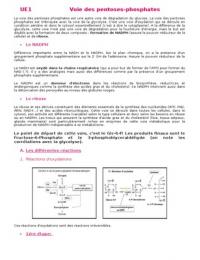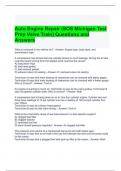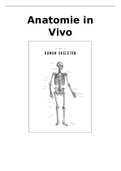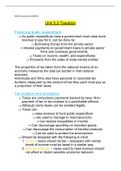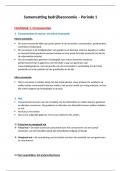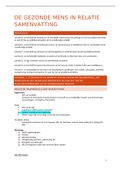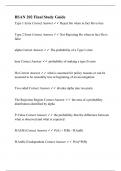A patient has a malignant brain tumor, what pharmacokinetic phase may be affected by the presence of a
tumor? -ans Distribution phase
A patient has an order for a tetracycline antibiotic and has been instructed to avoid taking the medication with
foods, beverages, or drugs that contain calcium, iron, or magnesium. The patient takes the antibiotic along with
a daily multivitamin, not realizing that the vitamin contains iron. What effect may this have on the tetracycline?
-ans Impaired absorption
A patient who is in renal failure may have a diminished capacity to excrete medications. The nurse must assess
the patient more frequently for what development? -ans Increased risk for drug toxicity.
A patient with cirrhosis of the liver exhibits decreased metabolic activity: This will require what possible
changes? -ans Reduction in the dosage of the drugs. More frequent monitoring for adverse drug effects.
Absoprtion -ans process involving the movement of a substance from its site of administration, across body
membranes, to circulating fluids.
ac -ans before meals
Active Transport of drugs -ans movement of a chemical against a concentration or electrochemical gradient
ad lib -ans as desired/as directed
Adrenergic Antagonist -ans Blocks physiological reactions to stress
affinity -ans attraction
After a drug is administered, it is called -ans a medication
, agonist -ans a drug that produces the same type of response as the endogenous substance
allergic reaction -ans an acquired hyperresponse of body defenses to a foreign substance (allergen)
AM -ans morning
Anaphylaxis -ans severe type of allergic reaction that involves the massive systemic release of histamine and
other chemical mediators of inflammation that can lead to life threatening shock.
apothecary system -ans older system of measurement (minims, fluid drams, ounces, grains)
Barriers that prevent medications from entering -ans blood-brain barrier, fetal-placental barrier.
bid -ans twice a day
Bioavailability -ans the physiological ability of the drug to reach its target cells and produce its effects.
Biologics -ans agents naturally produced in animal cells, microorganisms, or the body.
Biologics Control Act (1902) -ans Standardizes the quality of serums and other blood-relation products
Black Box Warnings -ans One of the primary alerts for identifying extreme adverse drug reactions discovered
during and after the review process.
Blocks Hormonal Activity -ans Angiotensin-converting enzyme inhibitor

